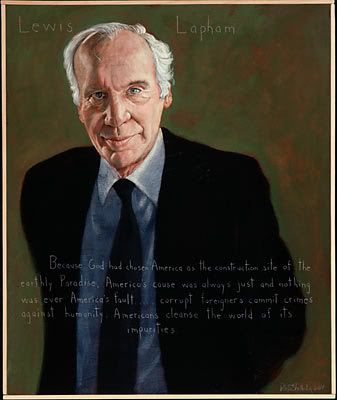
A year ago a co-worker told me he wouldn’t read Harper’s Magazine because “it was just another liberal rag” edited by an “insufferable egotist.” Admittedly, the quality of Lewis Lapham’s monthly contribution (“Notebook”), typically three or four pages of rhetoric following the reader letters, varies wildly. Lapham is a gifted wordsmith, but he is enamored of his craftsmanship; such writers can make splendid editors, but with their own work they are as prone to failure as they are eloquence. Whatever his overall batting average, Lapham’s May 2005 “Notebook,” entitled “The wrath of the Lamb,” is exemplary.
In “The wrath of the Lamb,” Lapham attacks the “faith-based initiative” that surfaced in the 1980s and now, with the reelection of George W. Bush, grows in strength. At a recent meeting of the National Association of Evangelicals in Washington, D.C., the group “declared [their] intent to lend a hand in the making of an American politics faithful to the will…of God.” After describing his early experiences with religion – he grew up in a secular household; “an unbaptised child raised in a family that went to church only for weddings and funerals” – in a time when secular philosophy ruled, Lapham moves on to his experiences as a young man observing the turning of the tide. God went from being dead – all that “remained to be discussed was the autopsy report” – to “[rising] from the graves of skepticism and science.” At the beginning of the 21st century, the “twin pillars of fear and intimidation” provided further insurance for the evangelicals; many people now flock to God, powerful elected officials included. As Lapham reminds us, “On the day after the 2004 election, Bush received a note from Bob Jones III, president of the eponymously named university in South Carolina: ‘…if you have weaklings around you who do not share your biblical values, shed yourself of them…’”
Not surprisingly, Lapham, like Bill Moyers, is troubled by the twelve volumes of the Tim Lahaye/Jerry Jenkins “Left-behind” series. (New York City is usually characterized as a secular fortress, but hardly a day passes when I don’t see one of these books being read on the subway or, more noticeable still, sold on the street by starry-eyed acolytes offering a “Free Stress Test.”) I have not read any of these books, but Lapham offers a small sampling, drawn from the twelfth book in the series, in which the writers describe the fate of secular types like myself.
”Their innards and entrails gushed to the desert floor, and as those around them turned to run, they too were slain, their blood pooling and rising in the unforgiving brightness of the glory of Christ.”Little wonder that environmental stewardship and human rights are deemed unimportant by so many contemporary evangelicals! As he nears the conclusion, Lapham writes,
“The delusional is no longer marginal, and we err on the side of folly if we continue to grant the boon of tolerance to people who mean to do us harm in the conviction that they receive from Genesis the command ‘to take dominion over the earth,’ to build the Kingdom of God, to create the Christian Nation. The proposition is as murderous as it is absurd…”I try to remain optimistic. Perhaps those evangelicals who absorbed Christ’s core teachings - those groups promoting stewardship and brotherhood, regardless of race or religion – will grow in number, adding volume to their message and overcoming their reactionary, bloodthirsty comrades. This is the best hope as I see it, for the evangelical hawks and Rapturists will not listen to reason. Reason, after all, is their enemy.
My “Strange Bedfellows” post in early March trumpeted the National Association of Evangelicals document, "For the Health of the Nation: An Evangelical Call to Civic Responsibility." The New York Times suggested the NAE platform was focused on caring for God’s creation via thoughtful environmental policy. This filled me with hope. Upon reading the article, I wrote:
“There will be some head-butting, but I would rather have the green evangelicals pushing against the tide of fundamentalists ushering in The Rapture, than have to deal with them myself. Secular environmentalists don't have to speak the language, but they must be willing to sit down at a table and draw up plans with groups like the NAE. Even if we all differ on some critical issues, our shared commitment to protecting the ecosystems that sustain us means enough to allow for a firm handshake and some hard work. Grudgingly, we can work alongside one another.”Sadly, excerpts from the actual document suggest a more sinister goal, the injection of Christian “values” into government. Lapham highlights the following selection in his piece.
“We also engage in public life because Jesus is Lord over every area of life…to restrict our stewardship to the private sphere would be to deny an important part of his dominion and to functionally abandon it to the Evil One. To restrict our political concerns to matters that touch only on the private and the domestic spheres is to deny the all-encompassing Lordship of Jesus.”Download the full text here. I have read the document in its entirety now. The declaration is more frightening than inspiring, but what I notice most is the inherent contradiction. For example, in one paragraph the NAE declares religious freedom essential while, further on, they call on Christians the world over to proselytize and save the damned. I don’t see much room for environmental policy if one is preoccupied with bible beating.
Photo credit: painting of Lewis Lapham by Robert Shetterly

No comments:
Post a Comment